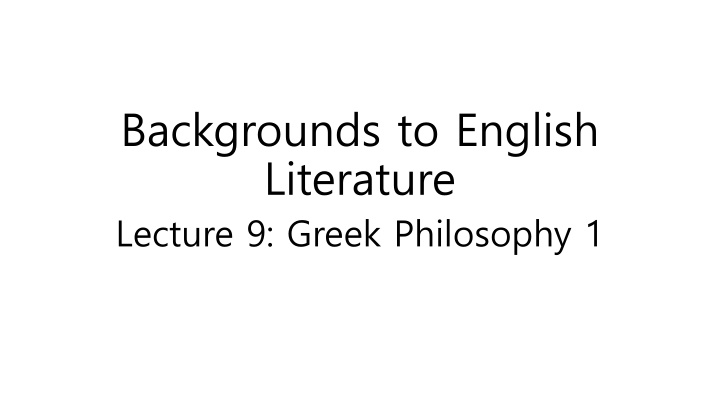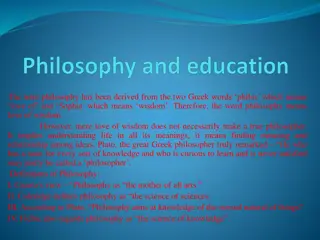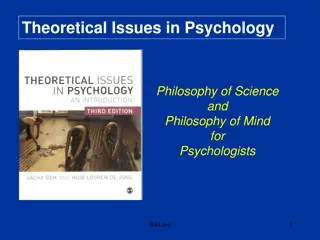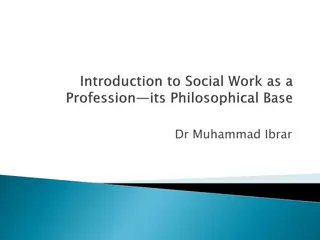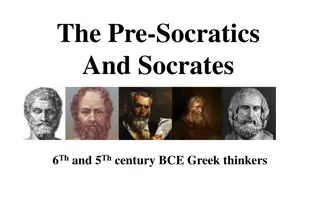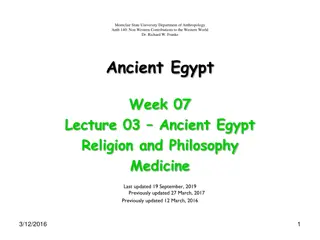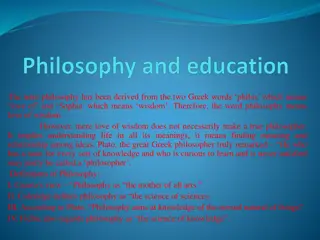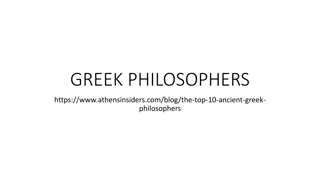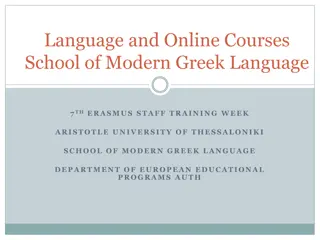Greek Philosophy: Origins and Influential Thinkers
Greek philosophy originated with the Pre-Socratics in the Ionian School around 600 BC, focusing on naturalistic explanations and cosmological theories. Thales, Anaximander, and Anaximenes were key figures, each proposing unique elemental theories. Pythagoras emphasized the mathematical nature of the universe. These thinkers paved the way for later philosophers like Socrates, Plato, and Aristotle, shaping the foundation of Western philosophy with their pursuit of wisdom and rational inquiry.
Download Presentation

Please find below an Image/Link to download the presentation.
The content on the website is provided AS IS for your information and personal use only. It may not be sold, licensed, or shared on other websites without obtaining consent from the author.If you encounter any issues during the download, it is possible that the publisher has removed the file from their server.
You are allowed to download the files provided on this website for personal or commercial use, subject to the condition that they are used lawfully. All files are the property of their respective owners.
The content on the website is provided AS IS for your information and personal use only. It may not be sold, licensed, or shared on other websites without obtaining consent from the author.
E N D
Presentation Transcript
Backgrounds to English Literature Lecture 9: Greek Philosophy 1
=Historical map of the Ancient Greek Philosophy -The Pre-Socratics -The Sophists -Socrates -Plato -Aristotle -Hellenistic Philosophy (the Cynics, Sceptics, Epicureans and Stoics.) =Origin of the term, Philosophy -The English word philosophy came from Old French filosofie (12c., Modern French philosophie) -filosofie directly from Latin philosophia and from Greek philosophia -philo =loving + Sophia = knowledge, wisdom: love of knowledge, pursuit of wisdom
Pre-Socratics =The Ionic School -About 600 BC, the Greek cities of Ionia were the intellectual and cultural leaders of Greece -Miletus, the southernmost Ionian city, was the wealthiest of Greek cities and the main focus of the Ionian awakening -The first group of Greek philosophers is a triad of Milesian thinkers: Thales, Anaximander, and Anaximenes. -Main characteristics: 1. Their approach required the rejection of all traditional explanations based on religious authority, dogma, myth and superstition. They all agreed on the notion that all things come from a single primal substance. 2. Their main concern was to come up with a cosmological theory purely based on natural phenomena (scientific method).
3. Observation was important for them. Anaximander, based on the fact that human infants are helpless at birth, argued that if the first human had somehow appeared on earth as an infant, it would not have survived: therefore, humans have evolved from other animals whose offspring are fitter. -Why Look at the Pre-Socratics?: Socrates, Plato and Aristotle produced their philosophy in reaction to and developing from that of the pre-Socratics. =Thales (624-550B.C.) -Founder or father of the Ionic School of philosophy. The very first philosopher -Believed that the universe was controlled by fixed laws -The principle of all things is water, that all comes from water & to water all returns -the earth is a flat disc which floats upon water
-The significance of Thales is not that this water philosophy has any value in itself, but that this was the first recorded attempt to explain the universe on naturalistic and scientific principles (not by myths & gods). =Other philosophers -Anaximander (610 546 B.C.): the beginning or first principle is an endless, unlimited mass, subject to neither old age nor decay, which perpetually yields fresh materials from which everything we can perceive is derived. -Anaximenes (585 528 B.C.): everything in the world is composed of air -Pythagoras (582-500 B.C.): The universe could only be understood through numbers. Famous for the Pythagorean Theorem: a2 + b2 = c2
=The Sophists -Etymology of the term, sophist: 1. From Greek sophists: a master of one's craft, a wise or prudent man, one clever in matters of daily life 2. Greek sophistes came to mean: one who gives intellectual instruction for pay -Who are the Sophists?: The sophists were itinerant professional teachers and intellectuals who went around Athens and other Greek cities in the second half of the fifth century B.C. In return for a fee, the sophists offered young wealthy Greek men an education in arete. -Democracy 1. About 500 B.C., Athens implemented a socio-political innovation by which all free male citizens had equal rights regardless of their origin and fortune.
2. Democracy allowed all free citizens to be part of the important decisions of the polis. They could engage in the discussions held during deliberative assembly and tribunals, their voices could be heard everywhere and had the same value as any other voice. 3. Speech and rhetoric: being able to discuss different topics effectively and to persuade others, granted a competitive advantage for a precondition of political success and also indispensable as a form of self-defence in the event that one was subject to a lawsuit. -Sophists 1. Protagoras (490-420 B.C.): Most famous of the Sophists. Plato reports he was the first to charge fees using that title. He believed that reason and knowledge should be used to achieve a comfortable, safe, and happy life. 2. Gorgias (485 - c.390 B.C.), Antiphon (470-411 B.C.), Hippias
-The interpretation of the sophists: Only a handful of sophistic texts have survived and most of what we know of the sophists is drawn from second-hand testimony. -The generally hostile depiction of them in Plato s dialogues. historical and philological difficulties confronting an Socrates (469 - 399 B.C.) =Who is Socrates? -Little is known about him, apart from the fact that he was born in Athens in the year 469 B.C.; his father was a sculptor and his mother a midwife; portraits and descriptions make it clear that he had a heavy, rather ugly, face, with a snub nose, prominent eyes beneath shaggy eyebrows, and a large full mouth. -Left no writings -Stories about Socrates
1. Socrates instructing a young and naive Plato to destroy his youthful attempts at poetry 2. Socrates standing for a day and a night rooted to the spot (wrestling with a thought), while others brought up mattresses to watch and take bets on how long he d stay there 3. The death of Socrates -He is the most influential philosopher and his footprints are everywhere, but the man himself as an elusive figure is nowhere to be found -Most famous student: Plato -The drawing of Socrates and Plato from Mathew Paris (1217-1259) in a 13th century manuscript (Bodelian Library, Oxford) and Derrida s response to it: he stumbled across it he stopped dead, with a feeling of hallucination . . . and of revelation at the same time, an apocalyptic revelation. It seems as if Plato is dictating to his teacher, Socrates, who is reduced to child-like obedience (the funny hat).
=Opening a new chapter in philosophy -Like the Sophists, Socrates enjoyed teaching, but unlike the Sophists he never requested a fee in return and lived a life of austerity. -He either underestimated or ignored most of the topics that were popular among his predecessors. Before the time of Socrates, philosophers main concern had been the physical world and how to explain it naturally. -Instead, Socrates set in motion a new approach by focusing entirely on moral and psychological questions. His methodology sought to define key questions such as: what is virtue? what is patriotism? what do you mean by morality? -Socrates set the standard for Western philosophy as we know it today in that he abandoned the study of natural science and turned to the study of human life.
=Socratic way of doing philosophy: Socrates dialectic method as a departure from earlier philosophers -Socrates method of discussion was a question/answer system in which he claimed ignorance and questioned the aristocratic youths of Athens. -5 steps: 1. Admit ignorance. 2. Never rely on tradition. 3. Continuously question. 4. Formulate your own opinions. 5. Test your opinions with others.
=Socrates on Trial -399 B.C. 3 Athenian citizens (Meletus, Anytus, Lycon) accused Socrates of two charges: corrupting the minds of the youth and heresy (impiety against the pantheon of Athens). He drank poison hemlock. -Why?: The trial and execution of Socrates in Athens in 399 B.C. puzzles historians. Why, in a society enjoying more freedom and democracy than any the world had ever seen, would a seventy-year- old philosopher be put to death for what he was teaching? -The two surviving accounts of the defense (or apology) of Socrates both come from disciples of his, Plato and Xenophon. Historians suspect that Plato and Xenophon, intent on showing their master in a favorable light, failed to present in their accounts the most damning evidence against Socrates.
-Historical and political contexts: 1. By combining a humble spirit (he never claimed to be any wiser than anyone else) and a strict agnosticism (he said he knew nothing) with a method that challenged conventional assumptions and an intolerance for unclear thinking, Socrates gradually earned enemies from various sectors of Athenian society. 2. Wealthy parents of these young men were not happy with the new ideas their sons were espousing, and, since many of them were involved in politics, they managed to make Socrates a controversial political figure. -Socrates s acceptance of the penalty: Athenians did not like to condemn a citizen to death, therefore, this was merely a formal sentence and he was offered the possibility to escape. He refused to do so and obeyed the jury s decision: a mixture containing poison hemlock took away his life, but his example granted him immortality.
-Plato described Socrates' death in the Phaedo: The man laid his hands on him and after a while examined his feet and legs, then pinched his foot hard and asked if he felt it. He said No ; then after that, his thighs; and passing upwards in this way he showed us that he was growing cold and rigid. And then again he touched him and said that when it reached his heart, he would be gone. The chill had now reached the region about the groin, and uncovering his face, which had been covered, he said and these were his last words Crito, we owe a cock to Asclepius. Pay it and do not neglect it. That, said Crito, shall be done; but see if you have anything else to say. To this question he made no reply, but after a little while he moved; the attendant uncovered him; his eyes were fixed. And Crito when he saw it, closed his mouth and eyes.
=Who is Plato? (427 - 347 B.C.) -Served in the Peloponnesian War. -Opted for a political career after the war, joined the oligarchy of the Thirty Tyrants, but their violent acts disillusioned him and he left. -In 403 B.C. democracy returned to Athens, but Plato seemed little interested in politics. -Plato was a student of Socrates who left Athens disgusted by the death of his teacher in 399 B.C. Travelling to Egypt, Sicily, and Italy. -In 387 B.C. he returned and founded the Academy. He presided institution, which encouraged research and instruction in philosophy and science, until he died. -He is the best known Greek philosopher in the western philosophy. Alfred North Whitehead: The safest general characterization of the European philosophical tradition is that it consists of a series of footnotes to Plato. military from 409-404 B.C., the end of the
=Identity of Philosophy? -Plato, The Prince of Philosophy, asked many of the fundamental philosophical questions that philosophers still ask today -Plato attempts to establish the notion of philosophy, differentiating it from other disciplines.
=Criticism on literature in Platos Republic X -Point 1: Representation of poetry and art is Illusion -Point 2: Art and poetry appeal to the lower, less rational part of our nature. -Point 3: Dramatic poetry in particular, has a bad effect on its audiences, who learn to admire and imitate the faults it represents. =Distinction between sophist and philosopher -Histories of philosophy tend to begin with the Ionian physicist Thales, but the presocratics referred to the activity they were engaged in as historia (inquiry) rather than philosophia. -The notion that philosophy begins with Thales derives from the mid nineteenth century. -The terms philosopher and sophist were disputed in the fifth and fourth century B.C. The subject of contention between rival schools of thought.
-It was Plato who first clearly and consistently refers to the activity of philosophia. -The related questions as to what a sophist is and how we can distinguish the philosopher from the sophist were taken very seriously by Plato. =Theory of Ideas -One of his most influential insights is the Theory of Ideas or Forms -Notions like virtue, justice, beauty, goodness, etc., would not be possible unless we had some direct knowledge of these things in an earlier existence. -The world that appears to our senses is in some way defective and filled with error, but there is a more real and perfect realm, populated by entities (called forms or ideas ) that are eternal, changeless. -The most fundamental distinction in Plato's philosophy is between the many observable objects that appear beautiful (good, just, unified, equal, big) and the one object that is what beauty (goodness, justice, unity) really is, from which those many beautiful (good, just, unified, equal, big) things receive their names and their corresponding characteristics.
Group discussion -Question 1: Imagine that you are Socrates, and what is your decision on the death sentence, which is not fair. Are you going to accept it or escape from it? If you accept it, what are your last words? -Question 2: Do you think your life is fully fixed by your own choice? Or is there any area of power which has a crucial influence on your life?
